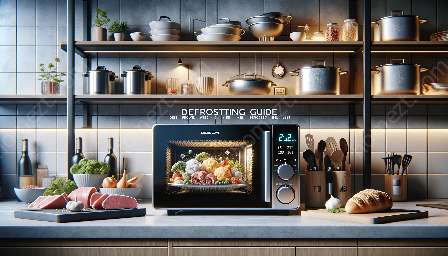Microwaves have become an indispensable part of modern kitchens due to their convenience and time-saving abilities. Understanding microwave wattage is crucial for achieving optimal cooking results. In this detailed guide, we will explore the importance of microwave wattage, how it affects cooking, and how to choose the right microwave for your needs. Additionally, we will delve into the functionality of microwaves, providing a comprehensive understanding of this essential kitchen appliance.
1. What Is Microwave Wattage?
Microwave wattage refers to the amount of power a microwave oven uses to cook food. It is a measure of the microwave's energy output and is typically displayed on the appliance's label. The wattage of a microwave determines how quickly and evenly it can cook or heat food. Higher wattage microwaves have more power and can cook food faster than lower wattage models.
Most microwaves have wattages ranging from 600 to 1200 watts, with some commercial and industrial models reaching higher power levels. Understanding a microwave's wattage is important as it directly impacts cooking times and the overall cooking performance of the appliance.
2. The Impact of Microwave Wattage on Cooking
The wattage of a microwave plays a significant role in determining how quickly and evenly food cooks. Higher wattage microwaves can heat and cook food more rapidly, making them ideal for busy households and individuals with limited time for meal preparation. They are capable of quickly reheating leftovers, cooking frozen foods, and preparing meals in a fraction of the time it takes lower wattage microwaves.
Conversely, lower wattage microwaves may require longer cooking times to achieve the same results. However, they can be suitable for individuals who prefer more controlled and gentler heating, especially when dealing with delicate foods that may be prone to overcooking or drying out in high-powered microwaves.
It is important to consider the wattage of a microwave when following recipes, as cooking times and power settings may need to be adjusted based on the appliance's power output. Understanding the relationship between wattage and cooking performance can help users make informed decisions regarding their microwave cooking needs.
3. Choosing the Right Microwave Wattage
When selecting a microwave oven, it is essential to consider the wattage that best aligns with your cooking habits and needs. Here are some factors to keep in mind when choosing the right microwave wattage:
- Cooking Preferences: If you frequently cook or reheat meals that require minimal time and effort, a higher wattage microwave may be beneficial. On the other hand, if you prefer slower, more controlled heating, a lower wattage model may be more suitable.
- Household Size: Larger households may benefit from higher wattage microwaves, as they can accommodate larger quantities of food and expedite meal preparation. Smaller households or individuals with lighter cooking needs may find lower wattage microwaves sufficient.
- Space and Budget: Consider the available space in your kitchen and your budget when choosing a microwave wattage. Higher wattage models tend to be larger and may come with a higher price tag, while lower wattage microwaves are often more compact and budget-friendly.
- Cooking Versatility: Some individuals may require a microwave with a range of power settings and cooking options. In such cases, choosing a model with adjustable wattage levels or multi-stage cooking capabilities can provide greater versatility in food preparation.
By assessing these considerations, you can make an informed decision about the appropriate microwave wattage that best suits your household and cooking preferences.
4. Understanding Microwave Functionality
In addition to understanding microwave wattage, it is helpful to comprehend the basic functionality of microwave ovens. Microwaves utilize a form of electromagnetic radiation to agitate water molecules in food, generating heat that cooks or reheats the items. This process allows for rapid and efficient food preparation, making microwaves a practical and time-saving kitchen appliance.
Microwaves are equipped with a magnetron, a component that generates microwave radiation, and a control system that manages the oven's operation. The interior of the microwave is lined with a metal waveguide that distributes the microwave energy, ensuring even heating throughout the cooking compartment. Modern microwaves often feature rotating turntables or stirrer systems to promote uniform cooking and heating.
Understanding the fundamental principles of microwave functionality can empower users to utilize these appliances effectively and explore the diverse cooking possibilities they offer.
Conclusion
In conclusion, understanding microwave wattage is essential for optimizing cooking performance and achieving desirable results. By recognizing the impact of wattage on cooking times and considering the factors that influence the choice of microwave wattage, consumers can make informed decisions when selecting a microwave oven. Furthermore, comprehending the basic functionality of microwaves enhances the overall understanding of these versatile kitchen appliances.
Whether you seek a high-powered microwave for efficient meal preparation or a lower wattage model for gentler cooking, assessing your cooking habits and household needs will guide you in choosing a microwave with the right wattage. Embracing the diverse capabilities of microwaves and leveraging their functionality can elevate your culinary experiences and streamline your meal preparation process.





















